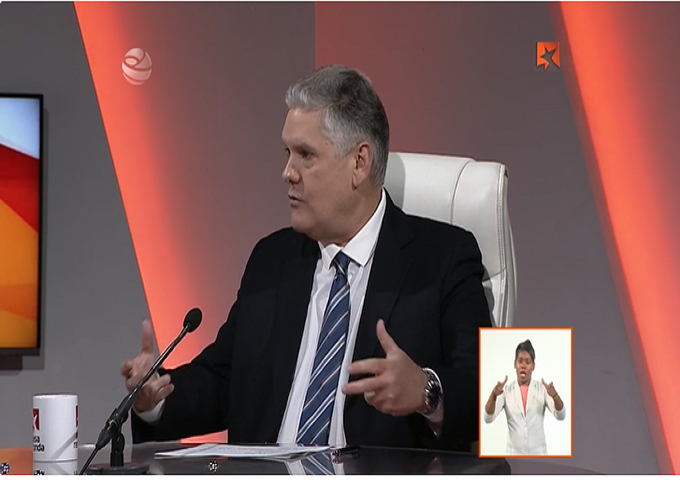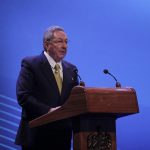Mayabeque, Cuba: The Vice Prime Minister, Alejandro Gil, appeared today on the Mesa Redonda television show to discuss relevant issues of the Cuban economy, including the progress of the economy at the beginning of the year, the impact of the measures adopted as part of the socioeconomic development strategy, inflation and other topics of interest, informs this Thursday at the Round Table, the Deputy Prime Minister and Minister of Economy and Planning, Alejandro Gil Fernández.
At the last meeting of the Council of Ministers, held on February 1, Cuban President Miguel Díaz-Canel assured that improving supplies to the population and containing inflation are two of the tasks on which the Government is working most intensely.
How is the economy doing in the first months of the year?
At the beginning of his speech, the minister recalled that for this year a growth of the gross domestic product of around 4 percent was projected, a goal that is maintained, taking into account that the indicators at the end of January have behaved as expected, although “with some deviations” due to the impact of the omicron variant.
In the first month of the year, 86,000 visitors have arrived in the country, 64,000 more than in the same stage of 2021. An additional 30,000 tons of agricultural products are also quantified, “which shows that the effect of the 63 measures approved to stimulate agricultural production is beginning to be appreciated”, he said.
Likewise, progress has been made in the expansion and improvement of the non-state sector, with the incorporation of new economic actors (there are already almost 2,000 approved MSMEs). “This will begin to have a greater impact in 2022, since they are now in the process of constitution, registration and creation of conditions”.
According to data from the Ministry of Economy and Planning, there are currently about 8,000 self-employed workers who have more than three employees. For this reason, they must be reconverted into MSMEs or cooperatives, Gil Fernández said, adding that more than 30,000 jobs have been generated with the approval of MSMEs and cooperatives, of which 40 percent are new ventures.
This measure aims to increase supply. “Of course, there are material restrictions in the country, being what makes the growth dynamics of the economy more complex. But it is a favorable measure”, the minister said.
Work has also been done to increase the powers of the state company, the main actor in the Cuban economy. The minister highlighted that 200 entities already apply the new salary organization (which benefits 275,000 workers), which means that they are not obliged to use the salary scale.
“A very bold measure, unprecedented, and that has been applied gradually, but that will have a greater extension in 2022, provided that the companies comply with the approved parameters. It is a formula that generates greater autonomy and greater responsibility”, the minister said.
In the midst of a situation of economic restriction, more than 200,000 jobs have been created. “When the economy is moving forward in its recovery, this will be one of the main challenges”.
In addition, a greater stabilization of the national electricity system has been achieved. “In recent days we have had blackouts, but if we compare with last summer, there is clearly an improvement, very important for people’s lives and also for the functioning of the economy”.
After stopping the economic decline for three consecutive quarters, the country begins a recovery, although with a level of supply that is still much lower than demand.
“There is no doubt that the economy is in a very tense situation, experiencing an exceptional situation, with all the complexities that the intensified blockade incorporates, and we do not mention it to use it as an element of justification.
We have to overcome the blockade, which cannot be insurmountable. We have to find the paths, the ways to survive and develop”, he underlined.
He recalled that “in 2018 and 2019 we had a blockade, but not the same as now, based on the more than 200 measures approved by the Trump Administration, taking advantage of the cruelest moment, with the aim of destroying the Revolution, which complicates economic recovery”.
Regarding the results of certain sectors in February, the minister reported that 7,000 tons more have been stockpiled than in the same month of 2021, although he acknowledged that supply is still well below demand.
This has to be a shaking year for the socialist state enterprise
There are still many weaknesses and dissatisfactions, because “we believe that there is a more flexible framework than we sometimes appreciate, which is put into practice, above all, in the state sector”.
“This, has to be a shaking year for the socialist state enterprise”, he emphasized.
He added that “we have objective problems, blockade, lack of foreign exchange and infrastructure, but we have a lot of untapped potential and reserves. That is where we have to focus, also fighting the objective”.
According to the Minister of Economy and Planning, more than 500 companies with losses have been identified, “but the same formula cannot be applied in all cases. Many were losing money before and we didn’t see it, because the economy worked with a 1×1 exchange rate. Practically, imports were very cheap in national currency and profits were obtained with little level of activity”.
The devaluation of the national currency, he pointed out, has made it possible to make transparent a set of operations in the economy that previously gave profits to companies, but not to the country. There were also no incentives to export.
Today the causes of the companies that operate with losses are being reviewed, to arrive at the scenario in which those that are in these conditions are due to inefficiency.
“Today we still have to say ‘this company is at a loss, but we cannot assert that it is inefficient.’ It is at a loss because it buys at one price and sells at another that is capped, sometimes lower than the purchase price. There are complexities that this year we have to clean up,” the minister said.
This issue, he continued, is a priority and in the design of the economy plan for 2022 each case is being analyzed. “By allowing all costs to be expressed in prices across the board, we do nothing, because we would be giving up the opportunity to make an adjustment in favor of efficiency”.
It is a decision that will be applied exceptionally, he said, and stressed the need to reduce staff and adjust indirect positions.
Gil Fernández pointed out that “work has been done to eliminate obstacles. There are issues that are not done, and it is not known why. The chain between the economic actors is the profit of our model, it is a single economy. There are still many subjective obstacles. We are calling to work without fear, to seek solutions, and there are companies, in all sectors, with very good results.
“We need entrepreneurs who do not stop at a no, because there are cadres who, by staying in their comfort zone, say ‘this cannot be done, this must be consulted'”.
The expansion of the non-state sector creates a more competitive environment, he said.
In this scenario, “we find state companies concerned because SMEs are being approved for their activity,” said the minister, stressing that “the state company is the main actor, but it has to earn it.”
The current process “has not been used in all cases. One sees a lot of slowness and fears. Not all measures are used yet. At the same time, there are many enterprises and people who are looking for solutions and find them.
“One finds companies that do more or less the same thing, and one has profits and the other has losses. If we now pass the costs for the prices to the loser, we leave it in the comfort zone. This is one of the fundamental tasks that we have now”, affirmed the minister.
“It seems to us that we have made progress in the discussion of the municipal assemblies of People’s Power and also, with the workers, on the plan and the budget. This year has been qualitatively superior, and we have to continue perfecting it. We are already seeing how we are going to do it for 2023, ”he added.
The goal, he explained, is that people really get together, prepare, discuss and can give the elements, and that they do not become unsatisfied demands.
“Sometimes they tell us that we must give full autonomy to the state company so that it decides what matters and what investments it makes. There is a part of the autonomy that you can give it on paper, but it depends on there being resources. If the country does not have the resources to support them, you can have the autonomy to decide what you import, but where do you get the dollars? There are contours to be able to develop that autonomy.
“We are going to focus on what we can do. If we do it right, the other will come faster,” he said.
All this, he added, taking into account the control of covid-19. “Without that we achieve nothing. That is the starting point”.
According to Gil Fernández, the conditions are created for 2022, without aspiring to make great leaps. “We lost 13 percent of GDP in a short period of time, more than 3 billion dollars, and we have not given up social spending. We have maintained levels of social spending without having the income. We have even injected money into circulation to protect interrupted workers. And this is part of the inflation that we have.
“But this is a socialist country. We could have a deficit of 3 percent of GDP, but we would have had to close schools and hospitals and lay off workers.
The effective way to deal with inflation lies in increasing supply.
“Today we have a larger deficit budget than we would like to. We have to work to reduce it without shock policies. That is the challenge that this country has, with an inclusive policy, always thinking of solutions for more than 11 million people, not for a minority”, he stated.
Currently, there are more than 6,000 containers in different ports around the world with sanitation, raw materials, etc., destined for Cuba. “Logistics and costs are challenges. The goods arrive out of date”, the minister said.
He recalled that inflation is today a worldwide phenomenon. “In the country it is the subject of most debate and concern. And for us, of high occupation. We are permanently looking for alternatives within the possibilities we have”.
Inflation, he explained, is taking place in two ways. First, due to an increase in costs, not the devaluation of the national currency with the Ordering Task, a devaluation that had its design and that was tried to control with the increase in wages, but prices have risen much more than the wage that was design.
“Then, there is a real increase in the costs of the country’s exports and a supply deficit and therefore, an excess of liquidity. It’s a combination that equals inflation”, he said.
He went on to explain that, as a concept, inflation is a general increase in prices over a given period of time. As a policy of the country, certain products and services with a high impact on the life of the population have been maintained with capped prices.
“These prices are not reflecting the global phenomenon that exists”, the Cuban deputy prime minister said. For example, when the much-discussed electricity tariff was put into effect in January 2021, fuel costs were around $53 a barrel. Today they are above 90 dollars a barrel.
“We have not touched the electricity rate or the price of fuel that is sold in the Cupet. Nor the rates of communications; in fact, we have lowered them. And they are in high demand and consume electrical energy. Nor have we moved the prices of the regulated family basket, which are insufficient and few, and are not enough to meet the needs of the population.
“Likewise, the prices of a series of products that we are selling in stores in national currency, such as chicken and oil, have been maintained.
“When we talk about inflation in Cuba, without wishing to dismiss it, because what we have is a very complex phenomenon, we are not in a context where all prices have skyrocketed, but there is a set of prices that have remained stable, according to Government policy, and regardless of international prices. It is not a widespread phenomenon,” he stated.
He added that a series of measures have been taken in the country.
“There is a broad consensus in academic circles, government agencies and the population that the effective way to deal with inflation is to increase supply. The supply deficit increases this phenomenon and brings with it speculation and resale.
“So, inflation multiplies. It is not only expressed in the cost of the product. There are hoarders who buy the product at a price and sell it three or four times more expensive. Why? It is a crime; they have no solidarity and try to live without contributing to society. But from the economic point of view, the underlying cause is the supply deficit”, the minister explained.
“If there was a stable supply, it would not be necessary for anyone to resell anything. But we know that when you release something it runs out quickly, it is bought, resold and the population pays a price much higher than the official price.
“We cannot face this phenomenon with the increase in wages. This would immediately lead to an increase in liquidity in the hands of the population, which will again put pressure on prices and they will rise again. It is a never ending cycle.
“In addition, the increase in wages increases business costs. Companies have to carry that expense to their cost tabs.
“So, if you don’t have a stable supply level, you can’t dream that you’re going to solve it with salary increases. Most prices, in the end, are going to reflect that cost and go back to swallowing that balance. It is an option that is not sustainable from an economic point of view and is not long-lasting”, Gil Fernández continued in his speech.
The other issue is the price limit. “If you can’t raise wages and prices go up, we’re going to cap prices. We can do that in some cases (for example, fuel, electricity rates, communications, chicken in stores), but you can’t find all the prices in the country. We have already been there and the end result is an empty stage.
“Everything we do has to be aimed at increasing supply. That’s what we work for. To this contributes a greater autonomy of the state company, the MSMEs, the expansion of the self-work, the 63 measures in agriculture.
“There are already some products that have maintained some stability in prices, such as tomatoes, and that have even dropped, because there is a higher level of supply. That is the way to fight inflation and fight everything that has to do with speculation and scalping”, he maintained.
The other issue, he continued, “is ‘we are going to combat the supply deficit by filling the markets with imported products. With what currency? In the current context, in which we have to support the basic basket and the generation of energy, we do not have real and objective possibilities of aspiring to stability in the supply of products to the population through imports. We have to bet on national production.”
On this point, Gil Fernández specified that, amid the current restrictions, the country consumes between 100,000 and 120,000 tons of diesel in a month and approximately 25,000 tons of gasoline. “A 40,000-ton diesel ship may be costing $35 million, and it’s still going up. You easily spend between 160 and 180 million dollars a month”.
Likewise, the import price of rice in 2019 was 468 dollars per ton, but “today we are buying it at 633, almost 200 dollars more. We produce a part, but consumption is much higher.
“Beans were imported at 1,066 a ton in 2019. Today it is 1,082. We imported crude oil at 809 a ton, today it is 1,503. Refined oil cost us 879 dollars per ton, today it is 1,615, powdered milk was at 3,282 per ton, today it is at 4,135. We imported wheat for bread at 280 dollars per ton, today it costs us 459 ton and today it is at 350. Soy flour was at 405, and today it is at 547”.
To the increase in the prices of these products is added today the rise in the cost of freight, “which has multiplied by two and by three. Furthermore, we have no guarantee that these prices will not continue to rise. We have managed to contract the 2022 plan with some prices, but it is likely that they will continue to rise, as is happening with fuel.
“We have been working on the side of increasing supply and a set of measures have been taken that have to do with national production and even the measure to allow, without commercial character and without payment of tariffs, the importation of food, cleaning and medicines. A measure that was taken until December 31, 2021 and that has been extended until June 30 of this year,” the minister recalled.

Redacción Digital
Equipo de redactores del sitio web de Radio Mayabeque



